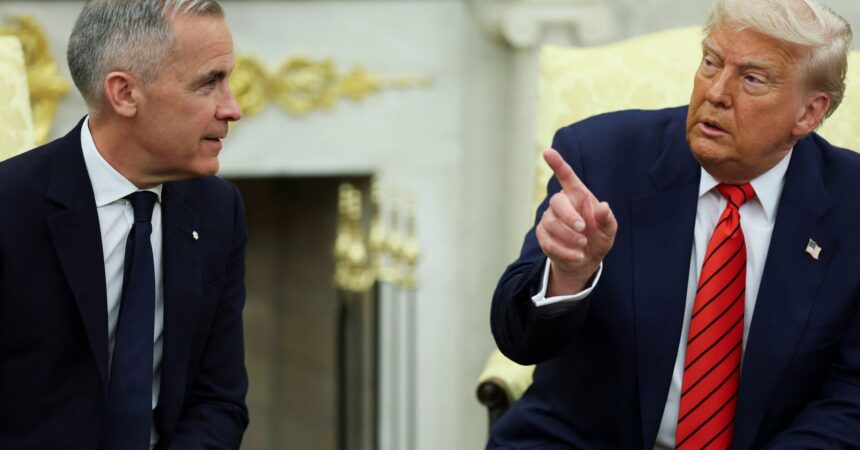While covering fintech startups last week, I kept hearing the same question in boardrooms across Toronto’s tech corridor: “What happens if the digital services tax actually goes through?” As of Monday, we finally have our answer—it won’t, at least not yet.
In a move that signals prioritizing trade harmony over tech taxation, Canada has officially rescinded its controversial digital services tax (DST) designed to target revenue from major technology companies. Finance Minister Chrystia Freeland announced the decision as part of broader efforts to advance stalled trade negotiations with the United States.
“This isn’t about abandoning our principles, but about strategic positioning,” Freeland stated during the announcement. “We remain committed to ensuring fair taxation in the digital economy, but recognize the current global economic climate demands flexibility.”
The proposed 3% tax would have applied to companies with global revenue exceeding $750 million and Canadian revenue over $20 million—essentially targeting giants like Google, Amazon, and Facebook while largely sparing homegrown Canadian tech companies. First proposed in 2021, the tax faced multiple implementation delays as international tax frameworks evolved.
Behind the scenes, pressure from Washington had been mounting. U.S. Trade Representative Katherine Tai had explicitly warned that implementing the tax would trigger retaliatory tariffs, potentially affecting $2.5 billion worth of Canadian exports across multiple sectors.
Adrian Wyld, chief economist at Toronto Commercial Bank, explained the pragmatic calculus: “When you’re looking at protecting maybe $400 million in potential tax revenue versus risking billions in export markets, it’s not really a close call. Canada blinked, but it was the rational move.”
For Canada’s tech sector, the reaction has been noticeably mixed. Michael Cheung, founder of Vancouver-based analytics platform DataSense, told me, “We’ve been in this weird limbo where we couldn’t properly forecast our tax obligations. At least now we have clarity, even if it’s not the outcome some had hoped for.”
The decision comes amid broader global efforts to establish consistent digital taxation frameworks. The OECD has been shepherding a two-pillar approach to international tax reform, with over 130 countries theoretically aligned on the principles. However, practical implementation has proven elusive, with the United States among those hesitant to fully embrace the proposed system.
“What we’re seeing is the collision between 21st-century business models and 20th-century tax systems,” noted University of Toronto economic policy professor Elaine Richardson. “Canada tried to bridge that gap unilaterally and discovered that trade relationships still trump taxation innovation.”
The tangible impacts of this decision extend well beyond tech taxation. Trade relations between Canada and the U.S. have been strained by multiple issues, including disputes over dairy markets, softwood lumber, and critical minerals policies. By removing the digital tax obstacle, Canadian officials hope to create momentum for progress on these fronts.
Trade data underscores why Canada might choose to relent. The U.S. remains Canada’s largest trading partner by an overwhelming margin, with bilateral trade totaling approximately $800 billion annually. For context, that’s roughly 75% of Canada’s GDP tied to this single relationship.
Prime Minister Justin Trudeau framed the decision as “strategic patience” rather than capitulation. “We’re committed to fair taxation, but we’re equally committed to maintaining the integrated economic relationship that supports millions of Canadian jobs,” he said during a press conference in Ottawa.
The tech giants most affected by the potential tax have remained characteristically quiet. When reached for comment, representatives from Google Canada offered only that they “continue to support efforts toward a consistent global tax framework” while Amazon pointed to previous statements supporting OECD-led approaches.
For Canadian tech startups, the decision removes one competitive variable but introduces others. Sarah Kamil, who runs an emerging AI startup in Waterloo’s tech hub, pointed out the double-edged nature of the decision: “Would it have been nice to see the giants paying more? Sure. But our business depends on American cloud services, distribution channels, and venture capital. We need that relationship to stay healthy.”
The move likely represents a temporary retreat rather than a permanent surrender. Finance Ministry officials have indicated they’ll continue participating in global tax reform efforts while reserving the right to revisit national measures if international frameworks fail to materialize.
What’s becoming increasingly clear is that digital taxation represents just one battlefront in a much larger reconfiguration of how countries balance sovereignty, taxation rights, and trade relationships in the digital age. With services increasingly untethered from physical locations, the fundamental question remains: where is value created, and who has the right to tax it?
As Canada demonstrates, answering that question isn’t just about tax theory—it’s about navigating complex economic interdependencies in a world where digital borders remain far more permeable than physical ones.
The outcome leaves Canada’s tech ecosystem with a clearer short-term outlook, but the longer-term question of how digital value will ultimately be taxed remains very much unresolved. For now, the can has been kicked down the road, but that road inevitably leads back to the same fundamental challenge.






